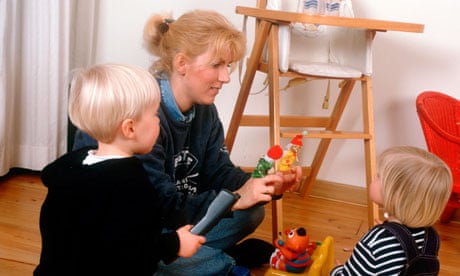The rising cost of childcare means that going out to work full-time is now hardly worthwhile for a growing number of "second earners" in middle- and low-income families, a major study will reveal this week.
In the most extreme case – where a second earner takes a full-time job at the minimum wage – a couple who use childcare could be left just £4 a week better off with two incomes than with one. Equally alarmingly for the government, the report, Counting the Costs of Childcare, by the politically independent Resolution Foundation, also says that childcare costs are eroding incentives to work for those on higher incomes.
The study finds that a family with two children in which two earners bring in a total of £44,440 could end up just £4,000 better off than a similar family earning £20,000 less, because of the combined effect of benefits, tax, tax credits and childcare costs. In some cases a family's income can fall when a second earner takes on more hours, because of the complexities of the tax and benefits regime.
The coalition and the Labour party, which have both set up policy commissions on childcare, are struggling to devise long-term answers as they court the potentially decisive female vote before the next general election.
The problem of how to get more women into work is now seen by politicians of all parties as a key economic and social challenge – the way to increase social mobility and living standards, tackle poverty, boost the economy and reduce the benefits bill for taxpayers.
Labour revealed it is looking at "co-operative childcare", in which parents could take a stake in the nurseries they use and take a share of the profits, reducing childcare costs by about £150 a year.
The shadow education secretary, Stephen Twigg, said: "We want to explore co-operative models, whereby local parents have a far bigger say in running their local nursery and get a share of the profits. Childcare centres are run successfully along these lines in Sweden and in some parts of the UK already. We want to see this model expand. Co-operative childcare can reduce costs to parents, provide flexibility for those who work and can reach communities that don't have enough nurseries."
The Resolution Foundation analyses disincentives built into the system of state support that have the perverse effect of cutting a family income in real terms as a second earner works more. It cites an example of how a second earner from a middle-income household who is paid £12 an hour will add £4,500 to the family income while working 13 hours a week.
However, if they increase their hours above that level, the family income falls as the combination of childcare costs and withdrawn support through the tax credit system bites into earnings. A low to middle income is defined for the childcare study as between £17,000 and £42,000 for a family with two children in childcare.
Vidhya Alakeson, deputy chief executive of the Resolution Foundation and joint author of the report, said: "Despite progress over the last decade, the cost of childcare in the UK still eats up a very large slice of family incomes. It's hardly worth a typical second earner going out to work more than a couple of days a week, because the family will be barely better off.
"This is a serious concern because increasing the level of female employment is one of the key routes through which family living standards have increased. We need major change in our childcare system to ensure that work is always worthwhile – and that working more hours or a pay rise results in higher take-home pay."
The report says the growth in female employment has been critical in maintaining household living standards over the last 30 years as men's employment income has declined in real terms. Affordable childcare is therefore essential in lifting incomes for those at the lower end of the income scale.
The latest figures from the Organisation for Economic Co-operation and Development, from 2008, put the proportion of income spent on childcare in the UK at 27% for a couple with a joint income of double the average wage, and 21% for a couple on one and half times the average. The Resolution Foundation says that these figures now stand at 30% and 19%.
A government spokesman said that for too many families, childcare costs mean it is not worth returning to work. He added: "The system needs reform. That is why we set up a commission to look at the affordability of childcare earlier this year. We are looking at best practice in France, Germany, Denmark and the Netherlands where high quality affordable childcare is available for parents and will be setting out proposals in due course."

Comments (…)
Sign in or create your Guardian account to join the discussion